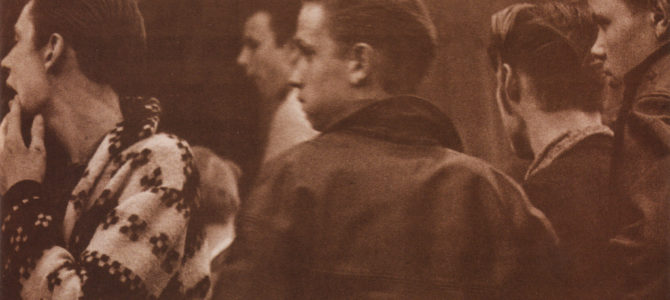
As U2 continues its tour celebrating the 1987 release of “The Joshua Tree,” I can’t help but think that lovers of 80s rock should be turning their attention to another significant 30th anniversary: when four lads from Northern England—one of the most important and beloved bands of their generation, led by a remarkable songwriting duo—decided to go their separate ways without even the courtesy of a farewell tour.
I’m referring, of course, to The Smiths, who dissolved gradually over the summer of 1987, making it official in early August.
The Smiths, if you’re not lucky enough to know about them already, were what we now call an indie-rock band from Manchester, England best remembered for their proto-emo sensibility, led by the idiosyncratic singer and lyricist Morrissey and the guitar genius Johnny Marr, supported by the underrated Andy Rourke on bass and Mike Joyce on drums.
They didn’t have any chart success in the States, but they did in the UK: between 1982 and 1987, they had five albums chart at #2 and another at #1. They were critically acclaimed and enjoyed the support of John Peel, one of the most influential DJs at the BBC. Rolling Stone listed four of the band’s five studio albums on its list of the 500 greatest albums of all time.
And like any great band, they suffered from extraordinary hubris: when they were invited by the biggest band in the world, The Police, to open for them during their UK tour, the Smiths declined. Morrissey insisted that his band was “more important than The Police will ever be.”
Morrissey is the main reason The Smiths have always been a divisive band. “He sounds like a tortured spy,” complained one letter writer to the music magazine NME. My brother’s point of comparison was Kermit the Frog (and he was not wrong). To their detractors, they’re just a bunch of mopes, like The Cure, only with more subdued hair.
Mark Monahon speaks for non-enthusiasts when he describes Morrissey’s voice as “a strange, gloomy, whiney wail” that:
oozed the self-indulgent miserabilsm of a 15-year-old boy who has just told his parents how much he hates them, lobbed his bowl of Angel Delight at the fish-tank and is speeding upstairs to paint his bedroom black…. Has any band has ever been so melodically limited, so calculatedly joyless, such a waste of a good guitarist, or fronted by such an inexplicably self-important frontman?
The Song-Writing Genius (And Moroseness) Of Morrissey
I like Morrissey’s voice, but I won’t try to convince anyone that it’s actually good. And there’s no denying Morrissey’s joyless side, which he sometimes took too far. One of the first songs the band recorded was about serial murders, and the song “Meat is Murder” is about, well, how meat is murder. (It’s also their absolute worst song, both lyrically and musically, which is why I’m sparing you a link.)
The dirge-like “I Know It’s Over” features some wonderfully self-indulgent sadness (“If you’re so very good looking—then why are you alone tonight?”) but gets excessive for all but the most morose misfits, as Morrissey declares, “Oh Mother, I can feel the soil falling over my head.”
Generally speaking, though, the band excelled in expressions of desperate longing and loneliness, “The Boy With a Thorn in His Side” and “How Soon is Now” being the best examples. At the same time, Morrissey also specialized in humorous overstatement that leavens his sadness, as in “There Is a Light That Never Goes Out”:
And if a double-decker bus crashes into us,
To die by your side is such a heavenly way to die.
And if a ten-ton truck kills the both of us,
To die by your side, well, the pleasure, the privilege is mine.
And for every truly, or overly, sad song they recorded, there is another in which Morrissey ironically plays with the misery for which he’s known. The songs “Unhappy Birthday” (“I’d like to wish you an unhappy birthday / because you’re evil and you lie / and if you should die / I might feel slightly sad / but I won’t cry”) and “Girlfriend in a Coma” are not to be taken seriously. “Heaven Knows I’m Miserable Now,” despite its title, includes the funnily suggestive lyrics, “What she asked of me at the end of the day, / Caligula would have blushed.”
In fact, far from being an unceasingly sad sack, Morrissey is consistently funny. He’s funny about celebrity culture:
Fame fame fatal fame,
It can play hideous tricks on the brain.
But still I’d rather be famous
than righteous or holy
Any day, any day, any day. (“Frankly, Mr. Shankly”)
He’s funny about obsession:
I dreamt about you last night,
And I fell out of bed twice. (“Reel Around the Fountain”)
About taste and class snobbery:
But to you, I was faceless, I was fawning, I was boring—
a child from those ugly new houses
who could never begin to know.
About his own talents:
She said, “I know you and you cannot sing.”
I said, “That’s nothing—you should hear me play piano.” (“The Queen is Dead”)
The Literary Inspirations Of The Smiths
I confess that Morrissey’s literary affectations were one of the first things that drew me to The Smiths. He made me believe that there could be something cool about being a book nerd: “There’s more to life than books you know,” he sings, “but not much more.” He mentions Keats and Yeats. He lifts a line from George Eliot’s novel Middlemarch in “How Soon Is Now.” There’s a title alluding to a Virginia Woolf essay. One song features an excerpt from Oscar Wilde’s The Importance of Being Earnest.
My senior year in high school, I wrote a long research paper about Morrissey’s legendary fondness for that Victorian author. Titled “Borne to be Wilde,” it…well, I don’t actually remember anything apart from the title. And although it was no doubt fascinating scholarship, it didn’t convince my teacher that The Smiths were worth listening to. It was the first of many hard lessons in the difficulties of musical evangelism.
While the band suited my literary pretensions, they were not a good fit for my athletic aspirations. I knew better than to put them on any of the psych-up mixes I listened to before my cross country and track meets, but Morrissey would still occasionally wind up crooning in my head during competitions.
“Why is the last mile the hardest mile?” he’d ask on the cross-country course, conjuring unease into my mind and fatigue into my legs.
“Does the body rule the mind, or does the mind rule the body?” I’d hear him ruminate on the track. Any good athlete could have answered that question for him—the mind rules the body Moz! Why must someone so young sing words so sad?!—but he’d bring doubt when he conceded: “I don’t know.”
It’s Not Just About Morrissey, Either
But focusing exclusively on Morrissey’s lyrics is playing into the hands of the critics; most people who love The Smiths do so in large part because of their guitarist and co-songwriter, Johnny Marr. Marr’s sound epitomized the jangle pop central to ‘80s college radio, yet he had few traditional solos, moments in the middle of a song where he’d take over and show off his guitar-god chops. Instead, he makes his presence known during guitar parts leading into, and chord progressions running behind, Morrissey’s vocals.
Marr’s music is another reason critics are wrong to dismiss The Smiths as suicide-note pop artists, as he’s responsible for a handful of songs that are as irresistibly bouncy as anything from the decade. The opening of “This Charming Man” is so giddy, you might as well be listening to Katrina and the Waves. “Barbarism Begins at Home” is probably the most danceable song about child abuse you’ll ever hear. (Its competition is admittedly limited.) At the same time, their sound holds up because they didn’t rely on stereotypically ‘80s production trends, like synthesizers and gated reverb drums.
There’s a great line from the song “Rubber Ring” that captures how music geeks react to the songs they love:
But don’t forget the songs
That made you smile
And the songs that made you cry
When you lay in awe
On the bedroom floor
And said: “Oh, oh, smother me Mother…”
That last line is a classic example of Morrissey taking his moroseness too far, but the rest rings true, and I did in fact lay in awe on my bedroom floor listening to “The Death of a Disco Dancer”—Morrissey’s lyrics, yes, but mostly what Simon Goddard calls the song’s “trippy, sonic pandemonium,” especially Marr’s spectacular guitar performance, which starts as a spooky crackle and builds to a frantic jam.
I may have written a paper about Morrissey, but a lot of my Smiths evangelism relied on Marr’s musicianship. I used to deliver mini-lectures to captive audiences in my car. “Have you heard anything like this?” I asked a group of friends about “William It was Really Nothing.” “Listen to that guitar. Isn’t it awesome? Listen—” turning up the volume right before the bridge—“here here here—isn’t that awesome?!”
One friend said only, “This is really fast.” Not the way you’d say, “Man, Eddie Van Halen can really shred.” More the way people say, “Oh, you got your haircut.” He left my car unconvinced.
But a couple of years later, when he made a mix for a party he was throwing, he snuck in “William It Was Really Nothing” between tracks by Dave Matthews and Rusted Root. I asked him about why the change of heart. “That guitar is so fast!” he said—this time, with feeling.
Remembering Why The Smiths Are Great
I have no memory of The Smiths breaking up. They’d already been history for a few years by the time I started listening to them—from a high school freshman’s perspective, a cultural eternity. But I still insist some commemoration is in order.
Morrissey seems like the kind of person who’d do something for this black pearl anniversary—perhaps a remix of “I Won’t Share You,” a track from the final album that’s believed to be about his desire for Marr to stay with the group. But the band will not make new music together, and they will not reunite to play their old stuff. That’s fine—they were never supposed to be U2.
Shortly after The Smiths broke up, a teenage fan in Colorado plotted to highjack a radio station and make them play his Smiths albums. (He gave himself up before carrying out the plot—typical him, he started something he couldn’t finish.) That’s the classic move of a Smiths fan, forcing people to learn to love them, either by force of arms or an essay.
But something along those lines seems like a good thing to do now. Just listening to them again, remembering why you liked them in the first place, and becoming sad at the passing of time and all of its sickening crimes.









